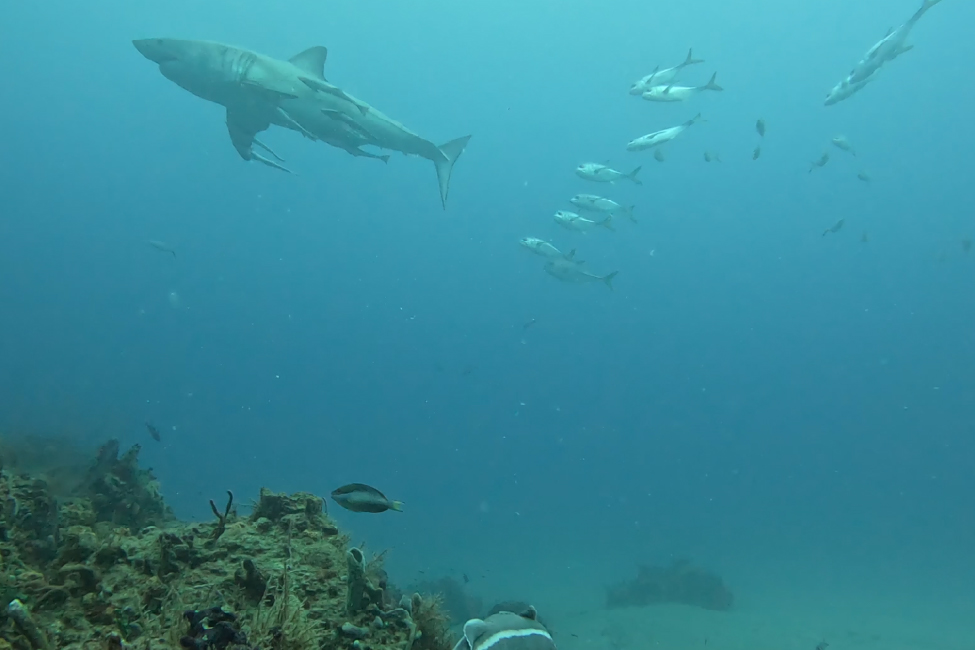Photobomb: Shark Cam Captures Ocean Encounter With a Great White

Shark cam footage of a great white shark, estimated to be at least 10 feet long, captured by a nurse shark off the coast of Boynton Beach.
In an unprecedented underwater encounter, a nurse shark equipped with a camera tag had a “shark’s eye view” of a great white shark off the coast of Boynton Beach. This stunning find has delighted marine biologists from Florida Atlantic University, marking what they believe to be the first-ever photobomb unknowingly documenting a great white shark in South Florida waters.
For years, Stephen Kajiura, Ph.D., a professor of biological sciences at the FAU Charles E. Schmidt College of Science, and his team have been studying the migratory patterns and behavior of sharks in the waters off Palm Beach County. While their typical research focuses on species such as blacktips, hammerheads and lemon sharks, this particular encounter took an unexpected turn.
Researchers equipped a nurse shark with a bright orange, lightweight camera tag, designed to collect both video footage and 3D acceleration data (similar to the step-counting feature on your smartphone). This process had been carried out countless times before – attaching the tag to a shark’s dorsal fin, releasing the shark to go about its business, and retrieving the tag at a predetermined time once it pops off.
This time, however, the footage captured was anything but ordinary. As the nurse shark swam around Donny Boy Slipe Reef, an artificial reef consisting of 830 tons of limestone boulders, its camera tag recorded a four-minute interaction with a great white shark.
“While divers have reported seeing great white sharks here recently, this rare footage gives us a shark’s-eye view of the interactions between these two very different kinds of sharks,” said Kajiura. “Our footage clearly showed a great white, estimated to be at least 10 feet long, and reveals a rare moment of shark-on-shark action – or what we’re coining as a ‘shark photobomb.’”
As exciting as the footage was, retrieving the tag itself proved to be almost as lucky as the footage it captured. When the tag didn’t ping when expected, Kajiura feared it was lost.
“At that point, the chances of getting the tag back were slim,” said Kajiura.
Then, four days later, an unexpected ping came through, revealing the tag’s location. It had washed ashore at the Gulfstream Golf Club in Delray Beach. Kajiura found the tag package amidst seaweed on the beach and just inches away from the fresh tracks of a large beach tractor.
“We were incredibly lucky it didn’t get run over and crushed,” Kajiura said.
Among the research team is Genevieve Sylvester, a master’s student in the FAU Elasmo Lab, directed by Kajiura.
“What we captured on that footage was a completely unexpected surprise,” said Sylvester. “We were all huddled around my computer, reviewing the footage. When we saw the great white shark appear – more than once – we couldn’t believe it. To witness it from the shark’s point of view made it even more surreal. It was a truly an unforgettable moment for our entire team.”
This research is part of an ongoing effort to study shark behavior in South Florida. As the researchers continue their work, they plan to instrument more species with data logging camera tags, including lemon sharks and great hammerheads, and are excited about what new footage and insights may emerge.
“Stay tuned. There is much more to come. This is just the beginning of an incredible journey into the underwater world of South Florida’s sharks,” said Kajiura.
Kajiura has received long-term support for his research from the Colgan Foundation, a not-for-profit corporation founded by Sean P. Colgan to benefit athletic, scientific, environmental and education communities.
//
-FAU-
Latest Research
- Decoding a Decade of Grouper Grunts Unlocks Spawning Secrets, ShiftsFAU researchers used 12 years of underwater audio to study red hind groupers, whose sounds reveal courtship, mating and territorial behavior - offering key clues to ocean changes through sound.
- FAU/Baptist Health AI Spine Model Could Transform Back Pain TreatmentLower back pain is a leading cause of disability. To address this, researchers created a groundbreaking AI system that automates personalized lumbar spine modeling for more accurate diagnosis and treatment.
- Researchers Show How Healthy Habits Can Improve Cognitive DeclineFAU Schmidt College of Medicine researchers say cognitive decline is not inevitable with age and that up to 45% of dementia risk is linked to modifiable factors like poor diet, inactivity and isolation.
- Research Characterizes Remarkable Skills of Octopus Arms in the WildThink your multitasking is impressive? A new study reveals that wild octopuses use their arms with incredible complexity. Each of the eight limbs can perform any type of movement, but clear patterns emerged.
- Study: AI Agents Shift How Hotels Build Guest LoyaltyThe rise of artificial intelligence agents will introduce a new layer of complexity in how the hospitality industry navigates customer loyalty, according to four researchers at Florida Atlantic University.
- Unrealized Losses in U.S. Banks Hold Steady in Q2Unrealized losses in U.S. banks' investment securities portfolios remained mostly unchanged in Q2, according to a screener from a banking and finance expert at Florida Atlantic University.






